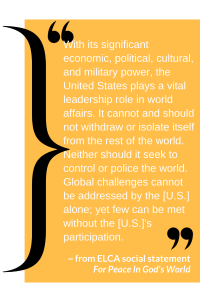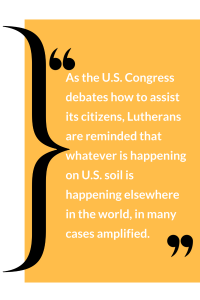By the Rev. Kaari Reierson, contractor with ELCA advocacy
The impacts of COVID-19 on U.S. citizens are simply unfathomable. Over 200,000 people have died. Unemployment is the highest it has been in the last 70 years. Tens of thousands of businesses have closed.
As difficult as COVID-19 and its many effects have been for those in the U.S., the effects have been multiplied in other parts of the world. As of this writing, the death rate in the United States is eleventh globally. The world’s economy is predicted to be pushed to a recession greater than any since World War II, putting millions more people into poverty.
 As the U.S. Congress debates how to assist its citizens, Lutherans are reminded that whatever is happening on U.S. soil is happening elsewhere in the world, in many cases amplified. Unemployment is confronting people with no savings – and no social safety net. Illness is afflicting people with minimal health care. Food scarcity is threatening people with no resources.
As the U.S. Congress debates how to assist its citizens, Lutherans are reminded that whatever is happening on U.S. soil is happening elsewhere in the world, in many cases amplified. Unemployment is confronting people with no savings – and no social safety net. Illness is afflicting people with minimal health care. Food scarcity is threatening people with no resources.
In response to a desperate world in 1939, Lutherans in the United States founded Lutheran Immigration and Refugee Service to assist Europeans displaced by World War II. Lutherans continue to participate regularly in international efforts to serve the neighbor and guard human dignity, through presence at the United Nations (U.N.), post-war relief in Europe, and engagement in development work and disaster response among many ways. ELCA social teaching recognizes that the U.S. plays a vital leadership role in world affairs and also has an obligation to share its resources with less wealthy nations.
Will our nation respond to the suffering imposed by COVID-19 outside of U.S. soil, or will we only take care of “our own?” Will the U.S. participate fully in international organizations working to quell the pandemic as our Lutheran history and social teaching would urge us to do?
 To turn the tide of a virus as contagious as COVID-19 requires a coordinated effort by the international community. The pandemic respects no national boundaries. If the U.S. refuses to engage with and help resource multilateral organizations such as the World Health Organization and U.N., it is not only failing to fulfill its moral obligation, it is endangering its own future. “U.S. support through bilateral foreign assistance programs is also vital to heavily impacted low-income countries,” says Patricia Kisare, ELCA Program Director for International Public Policy. “As members of Congress work on the next COVID-19 stimulus package, they must include funding for international response to address the tremendous needs caused by this pandemic.”
To turn the tide of a virus as contagious as COVID-19 requires a coordinated effort by the international community. The pandemic respects no national boundaries. If the U.S. refuses to engage with and help resource multilateral organizations such as the World Health Organization and U.N., it is not only failing to fulfill its moral obligation, it is endangering its own future. “U.S. support through bilateral foreign assistance programs is also vital to heavily impacted low-income countries,” says Patricia Kisare, ELCA Program Director for International Public Policy. “As members of Congress work on the next COVID-19 stimulus package, they must include funding for international response to address the tremendous needs caused by this pandemic.”
Illustrated by the history of Lutherans in the U.S., expanded in our Lutheran teachings, and sourced in the words and life of Jesus, caring for others is God’s work. “For the Christian, empathy is one way in which love and compassion (Matthew 25:31-46) may be embodied in the world of civil authority, through God’s left-hand work,” reads the ELCA social message “Government and Civic Engagement in the United States.”
You are invited to use “Take Action on the Next Coronavirus Supplemental Bill” in the ELCA Action Center to ask Congress to incorporate international relief measures as it moves our nation’s pandemic response into law.
